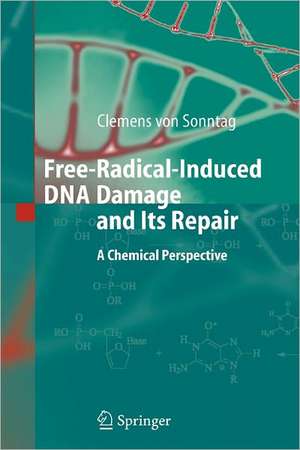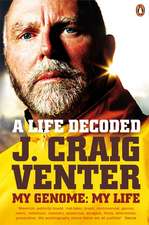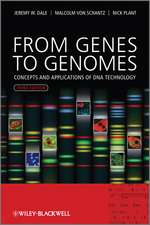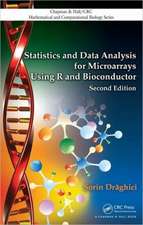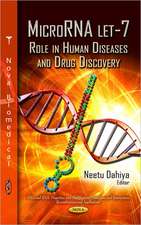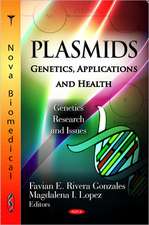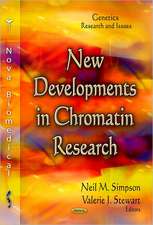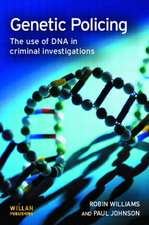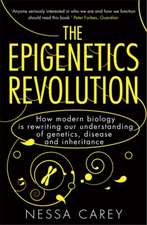Free-Radical-Induced DNA Damage and Its Repair: A Chemical Perspective
Autor Clemens Sonntagen Limba Engleză Paperback – 11 feb 2010
| Toate formatele și edițiile | Preț | Express |
|---|---|---|
| Paperback (1) | 1822.10 lei 6-8 săpt. | |
| Springer Berlin, Heidelberg – 11 feb 2010 | 1822.10 lei 6-8 săpt. | |
| Hardback (1) | 1833.78 lei 6-8 săpt. | |
| Springer Berlin, Heidelberg – dec 2005 | 1833.78 lei 6-8 săpt. |
Preț: 1822.10 lei
Preț vechi: 2222.06 lei
-18% Nou
Puncte Express: 2733
Preț estimativ în valută:
348.75€ • 359.40$ • 294.43£
348.75€ • 359.40$ • 294.43£
Carte tipărită la comandă
Livrare economică 01-15 martie
Preluare comenzi: 021 569.72.76
Specificații
ISBN-13: 9783642065545
ISBN-10: 3642065546
Pagini: 544
Ilustrații: XX, 523 p.
Dimensiuni: 155 x 235 x 29 mm
Greutate: 0.75 kg
Ediția:Softcover reprint of hardcover 1st ed. 2006
Editura: Springer Berlin, Heidelberg
Colecția Springer
Locul publicării:Berlin, Heidelberg, Germany
ISBN-10: 3642065546
Pagini: 544
Ilustrații: XX, 523 p.
Dimensiuni: 155 x 235 x 29 mm
Greutate: 0.75 kg
Ediția:Softcover reprint of hardcover 1st ed. 2006
Editura: Springer Berlin, Heidelberg
Colecția Springer
Locul publicării:Berlin, Heidelberg, Germany
Public țintă
ResearchDescriere
The free-radical chemistry of DNA had been discussed in some detail in 1987 in my book The Chemical Basis of Radiation Biology. Obviously, the more recent developments and the concomitant higher level of understanding of mechanistic details are missing. Moreover, in the living cell, free-radical DNA damage is not only induced by ionizing radiation, but free-radical-induced DNA damage is a much more general phenomenon. It was, therefore, felt that it is now timely to review our present knowledge of free-radical-induced DNA damage induced by all conceivable free-radical-generating sources. Originally, it had been thought to include also a very important aspect, the repair of DNA damage by the cell’s various repair enzymes. Kevin Prise (Cancer Campaign, Gray Laboratory, L- don) was so kind to agree to write this part. However, an adequate description of this strongly expanding area would have exceeded the allocated space by much, and this section had to be omitted. The directors of the Max-Planck-Institut für Strahlenchemie (now MPI für Bioanorganische Chemie), Karl Wieghardt and Wolfgang Lubitz, kindly allowed me to continue to use its facilities after my retirement in 2001. Notably, our - brarian, Mrs. Jutta Theurich, and her right-hand help, Mrs. Rosemarie Schr- er, were most helpful in getting hold of the literature. I thank them very much. Without their constant help, this would have been very difficult indeed.
Cuprins
Formation of Reactive Free Radicals in an Aqueous Environment.- The Hydroxyl Radical.- Hydrogen Atom and Hydrated Electron.- Inorganic Radicals.- Carbon-Centered Radicals.- Heteroatom-Centered Radicals.- Peroxyl Radicals.- Polymer Radicals.- Nucleobases, Nucleosides and Nucleotides.- Polynucleotides and Single-Stranded DNA Fragments.- DNA and Double-Stranded Oligonucleotides.- Methods.
Notă biografică
Born in 1936, Chemistry at Heidelberg, Vienna and Karlsruhe, PhD (1964 with D. Schulte-Frohlinde) and Habilitation (1970) at Karlsruhe. Postdoc with F. S. Dainton (Leeds). 1960-1970 Nuclear Research Center Karlsruhe, 1970- 2001 Max-Planck-Institut für Strahlenchemie, Mülheim. After retirement continuing collaboration with the Leibniz-Institut für Oberflächenmodifizierung (IOM), Leipzig.
Textul de pe ultima copertă
Understanding of the molecular basis of DNA damage and its repair has increased dramatically in recent years, and substantial knowledge now exists concerning the products arising from free-radical attack on DNA. Free-radical DNA damage may lead to mutations, cancer, and cell death. Free radicals have various sources, notably ionizing radiation and oxidative stress. In radiotherapy for cancer and with some anticancer drugs, use is made of cell death by excessive DNA damage. The mechanisms leading to products of free-radical attack which have been studied in models and with small double-stranded DNA fragments are discussed in detail, and the basics of the underlying free-radical chemistry are dealt with in separate chapters.
Caracteristici
Provides an invaluable reference tool for the study of free radical-induced DNA damage and its repair, balancing the chemical and molecular approaches
